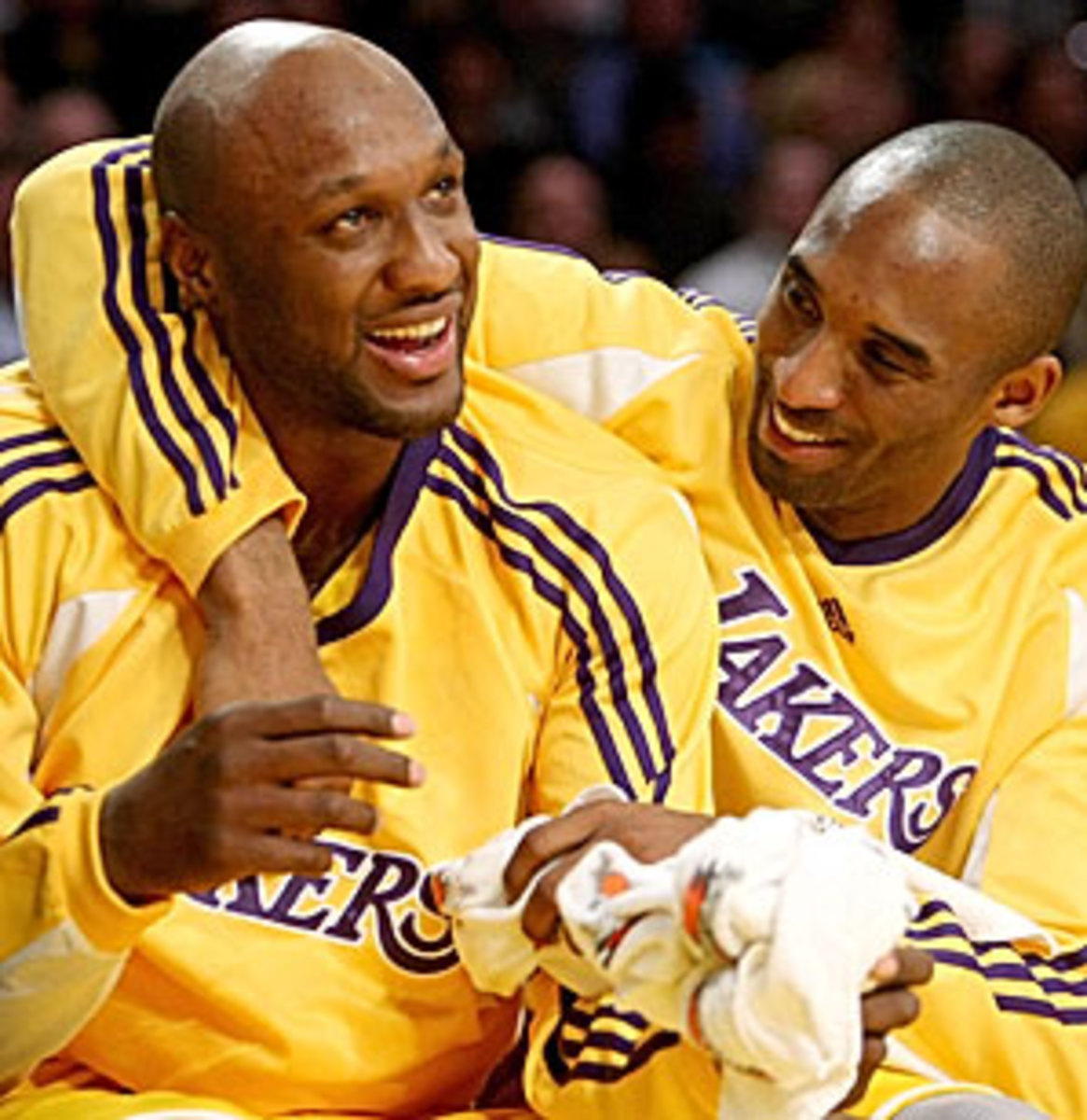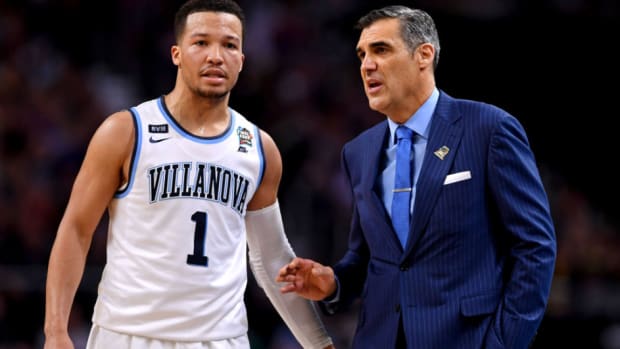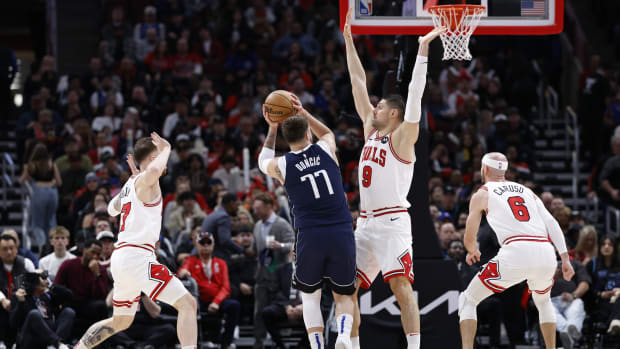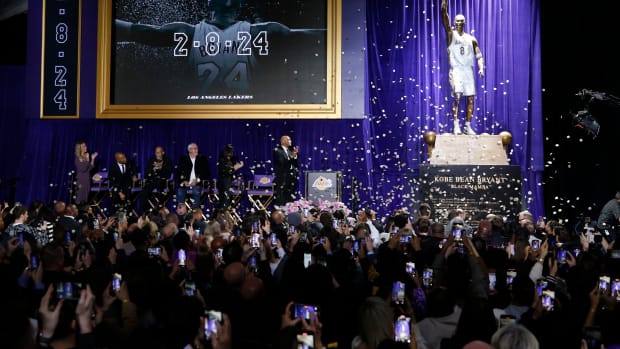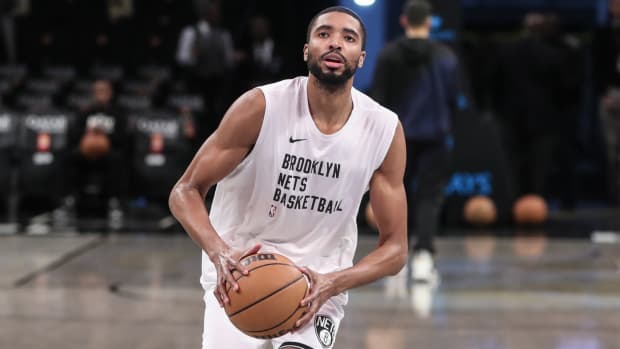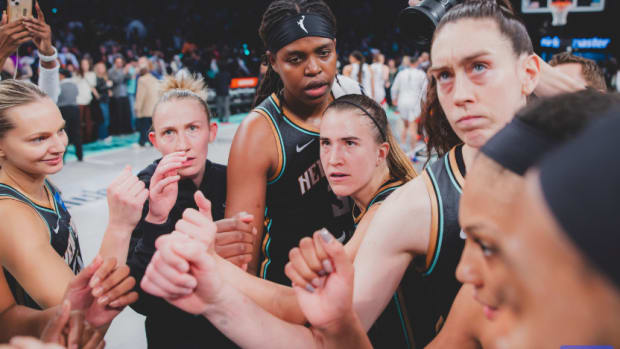Roundtable: 70 wins a possibility?
1. The 1995-96 Bulls (72-10) are the only team in NBA history to win at least 70 regular-season games. What's your early read on the Lakers' chances of reaching that milestone? How about the Celtics'?
Ian Thomsen: I don't see it as being important to the Celtics. As impressive as they've been overall, they've embarked on a bad trend this season of falling behind early in games and that is going to result in a few losses along the way. I see the Celtics making a priority of keeping Kevin Garnett, Paul Pierce and Ray Allen fresh and healthy going into the playoffs. Doc Rivers is likely to follow the example of Gregg Popovich's approach to pacing his team through the regular season, even if it means sacrificing a game or two.
The Lakers are too young to pull it off. That Bulls team was a highly professional and committed group that focused on the job each night. These Lakers around Kobe Bryant haven't even won a championship yet, so they have too much to learn before they can think of becoming the most dominant team of them all. The Lakers are very impressive and they have the game's best player, but let's wait until February or March and see how healthy they (and their rivals) are before we begin comparing them to the most accomplished teams.
Marty Burns: It's about as likely to happen as, say, your Thanksgiving turkey getting up and walking off the table. The Lakers have the size and depth to make a good run at it, but not the mental toughness (other than Kobe) to get all the way to 70. The Celtics have the mental toughness, but not the size and depth.
The NBA season is just too long for any team not led by Michael Jordan to win every game night in and night out in the dog days of February and March. We should know this by now. We've seen the Suns, Pistons and Celtics get off to similar red-hot starts in recent years only to fall way short of that magic 70 barrier.
Jack McCallum: Neither will come within 10 games of reaching it. Not only were the Bulls blessed with having the all-time assassin, Jordan, bent on reaching a record level of wins, but the team was also extraordinarily lucky in terms of injuries. Jordan, Scottie Pippen, Toni Kukoc, Steve Kerr and Ron Harper missed only a few games among them, and Dennis Rodman was fine in between suspensions. We are now in an era when players inevitably break down, and somewhere along the line this will happen to Boston or L.A.
Chris Mannix: Winning 70 games in the NBA is like winning 116 in baseball (done twice) or running the regular-season table in the modern-day NFL (also done twice). It's tough even under the best of circumstances. There is no question that the Lakers are the cream of the crop right now: They have size (Andrew Bynum, Pau Gasol, Lamar Odom), skill (Kobe) and a deep bench that enables them to stay in games even when their top players are struggling. But the West is just too tough for them to crack the 70-win barrier.
While the Celtics are the class of the East, they have been in a lot of close games early in the season. And the the age of their stars -- Paul Pierce, 31, Kevin Garnett, 32, and Ray Allen, 33 -- makes them susceptible to injury. This season will eventually prove to be more challenging than 2007-2008, when Boston won 66 games.
Steve Aschburner: I doubt the Lakers or anyone else will win 70 games because this isn't an expansion year. When Chicago won 72 games in 1995-96, Vancouver and Toronto were brand-new entries and absorbed 125 losses (the Grizzlies and the Raptors were a combined 1-5 against the Bulls). Several existing teams were inept, too, with Philadelphia (64), Milwaukee (57), Dallas (56) and Minnesota (56) all losing more than two-thirds of their games. Yet against that backdrop, only six teams besides the Bulls won at least 50.
Put simply, there are more good teams now. Last season, 11 teams won 50 or more. I expect 10 or 11 to do it again this year. Meanwhile, the bottom-feeders are getting better; of the seven teams that lost 56 or more last season, four -- New York, Milwaukee, Miami and Minnesota -- could push toward or past 30 victories. From there, all it takes is the wrong combination of back-to-backs and one semiserious injury to derail a club hoping for 70.
2. Is all the buzz about LeBron James and the rest of the potential 2010 free-agent market good for the league? Is it problematic that a few teams seem more interested in gearing up for 2010 than they do in competing now?
Thomsen: It's all good. Two things here. To land LeBron, Toronto's Chris Bosh or another great player, a team in free agency must spend the next couple of years developing an environment that will convince a great player he can win there. Cap space alone isn't going to do it. Not even the Knicks can afford to tank a season and hope to recruit an established star.
The other part is that teams like the Cavaliers, Raptors and Heat (who are worried about losing Dwyane Wade) have to be more committed than ever about trying to win now. Those three franchises would be ambitious anyway, but over the next two years they must show improvement or else risk losing their biggest asset.
This is a good thing for the league, because it's a demonstration of star players demanding that their teams win. We're likely to see more of this dynamic in the next collective bargaining agreement, when long-term contracts across the board are likely to be shortened and players will enter free agency at a faster rate than before.
Burns: Hope sells. Even if it's blind, better-chance-of-getting-struck-by-lightning hope. How else does one explain the lotto, reality TV and all those Cubs fans?
So, in that sense, it's probably great for the NBA. David Stern has to be cackling with glee as he rings up the cash register. Do you think all this talk about LeBron is going to hurt the Nets, Knicks and Pistons when it comes to season-ticket or skybox renewals between now and 2010? Besides, these LeBron suitors are not exactly gutting their rosters (at least not yet). They are all poised to stay reasonably competitive while they await 2010.
McCallum: Well, it seems bad and, for Clevelanders, I'm sure it's irritating as hell and only adding to the collective neurosis of those good folks by the Erie and the Cuyahoga. But in a rotisserie-league era and when true hoops fans work out theoretical deals as virtual general managers, this endless parlor game is here to stay ... and does provide some grist for conversation about bad teams.
Mannix: To paraphrase a quote from Seinfeld, it's not good for the league and it's not good for anybody. Look, I know that the summer of 2010 could change the fortunes of some teams and break the hearts of others ... but it's TWO YEARS AWAY! Teams like the Knicks and Nets have openly slashed payroll at the expense of team success, and I think by the All-Star break others (Dallas? Miami?) won't be far behind.
What's worth noting is that a creative general manager could exploit the misguided ambitions of others. Take Cavs GM Danny Ferry, who has seemingly been given a blank check by owner Dan Gilbert to build a strong talent base around LeBron. Ferry has a big bargaining chip in the expiring contract of Wally Szczerbiak ($13 million). Could Ferry, for instance, peddle Szczerbiak to New Jersey for Vince Carter? With one or two moves, Ferry could position the Cavs for a run at the title -- and appease James at the same time.
Aschburner: That 2010 buzz doesn't seem all that intriguing to fans in Cleveland, Toronto or Miami, and it doesn't do much for those in NBA cities where the local franchise will either be capped out or snubbed again as an unappealing free-agent destination. There's something not quite right, either, about treating 2008-09 and '09-10 as seasons to endure rather than enjoy, all for a potential payoff two years out. Trades make for great conversation and expectations, but we're facing two trading deadlines and one offseason in which too many deals will be made for cap rather than court strategies. That's why I'm tired of 2010 talk already.
3. Antonio McDyess, who was part of the Allen Iverson trade, is poised to re-sign with the Pistons after negotiating a buyout with the Nuggets. Per league rules, McDyess can't rejoin the Pistons until Dec. 3, or 30 days from the time he was traded. Should the NBA make it harder for players who were traded and then waived by their new team to return to their old team?
Thomsen: It's hard enough to make trades as it is. The league needs more loopholes like this that enable McDyess to return to Detroit. If Denver is happy with the outcome after negotiating a buyout with McDyess, then the league should be happy, too, because this trade made both franchises far more interesting than they had been.
Burns: McDyess isn't alone in re-signing with his old team after an apparent wink-wink trade. Gary Payton and Brent Barry did the same thing in recent years. It seems NBA GMs and agents could rival Fortune 500 accountants in their ability to find loopholes that help them get their desired result.
While I don't fault McDyess for getting his "cake" and eating it too, it does seem less than fair to the fans in Denver. How about a rule that says any player traded and then waived can sign with any other team except his former team for the remainder of the season? At least that way fans would know that the deal was on the up-and-up.
McCallum: Should the league make it harder? What it should do is make it impossible. Some kid in college has to sit out a year for transferring even if the coach who recruited him moved on, while in the NBA sham trades are orchestrated that fool no one. Make it so the player can't return to the original team for a year.
Mannix: If it can be proved that a team has made an under-the-table deal with the player, then it should be penalized severely, maybe even with draft picks. Otherwise, I say leave the rule alone. There are no guarantees that a player is going to want to return to the team that traded him. McDyess had other, more lucrative offers on the table, but he is choosing to pass because he is comfortable in Detroit. Who are we to deny him that right? I haven't heard any GMs complain about it, so I'm choosing not to either.
Aschburner: What, make it 60 days instead of 30? The rest of the season? Why? These guys only get dealt in the first place to accommodate the NBA's salary-matching rules. His original team didn't want to trade him, the second team obviously didn't want him and it all was done to adhere to business rules rather than improve a roster. (Now if the guy refuses to report, that's different. Then he should be suspended and subsequently prohibited from returning to his original club that season, because the team that acquired him had basketball plans for him.)
4. Did Eddie Jordan get a raw deal with the Wizards?
Thomsen: Jordan never had a full season with his three stars, and he began this year without his point guard (and best player in Gilbert Arenas) and center (much-improved Brendan Haywood). How often could the players hear the same voice urging them to overcome these kinds of absences? He had run out of things to say, as any coach would. Jordan will face constructive criticism that he didn't establish the Wizards at the defensive end of the floor, but that won't stop him from being at the top of any team's list next summer when jobs are being filled. The Wizards needed to bring in a new voice in hopes of salvaging this season, but the bottom line is that the success of the franchise will depend less on coaching than on the outcome of Arenas' knee surgeries.
Burns: No. Jordan is a fine coach and, from all accounts, a wonderful human being. He did a good job overall. I still can't believe he got them to the playoffs last year with all those injuries. He certainly can't be blamed for the Wizards' injuries this season.
But the bottom line is that the Wizards were 1-10 and needed a change. After more than five years, Jordan's way had run its course and Washington had to try something different. It's no different than what has happened to loads of NBA coaches over the years.
McCallum: Of course he did. Injuries, weak point guard play, fights between Haywood and Etan Thomas -- and with all that he also had to keep up with Gilbert's blog.
Mannix: There are two ways to look at Jordan's exit. One is that an underachieving playoff coach with a lack of defensive acumen was let go. The other is that a skilled offensive mind was bounced after his star player underwent his third knee surgery in 17 months. I think it was a blend of both, but the truth of the matter is that after five-plus seasons in Washington, Jordan had worn out his welcome. Jordan can't be blamed for the injury-ravaged Wizards' 1-10 start, but the early struggles were just the excuse GM Ernie Grunfeld needed to pull the trigger and pave the way for him to bring in a defensive-minded coach (paging Avery Johnson) to instill the kind of discipline this team needs to get to the next level.
Aschburner: Coach in the All-Star Game one season, get fired 21 months later? Jordan isn't the first and he won't be the last coach to succumb to classic NBA impatience. But Jordan wasn't the guy who signed the oft-injured and unavailable Arenas to that fat contract -- apparently, Arenas is important enough to risk $111 million on, but not wait more than 11 games for (he might be back in January). Haywood also is out, Antonio Daniels has been hobbled and Roger Mason is gone from last year's playoff club. Given all that, what would a reasonable victory total be right now? Five? Six? So Jordan got axed for losing four or five more games than he should have to this point.






























